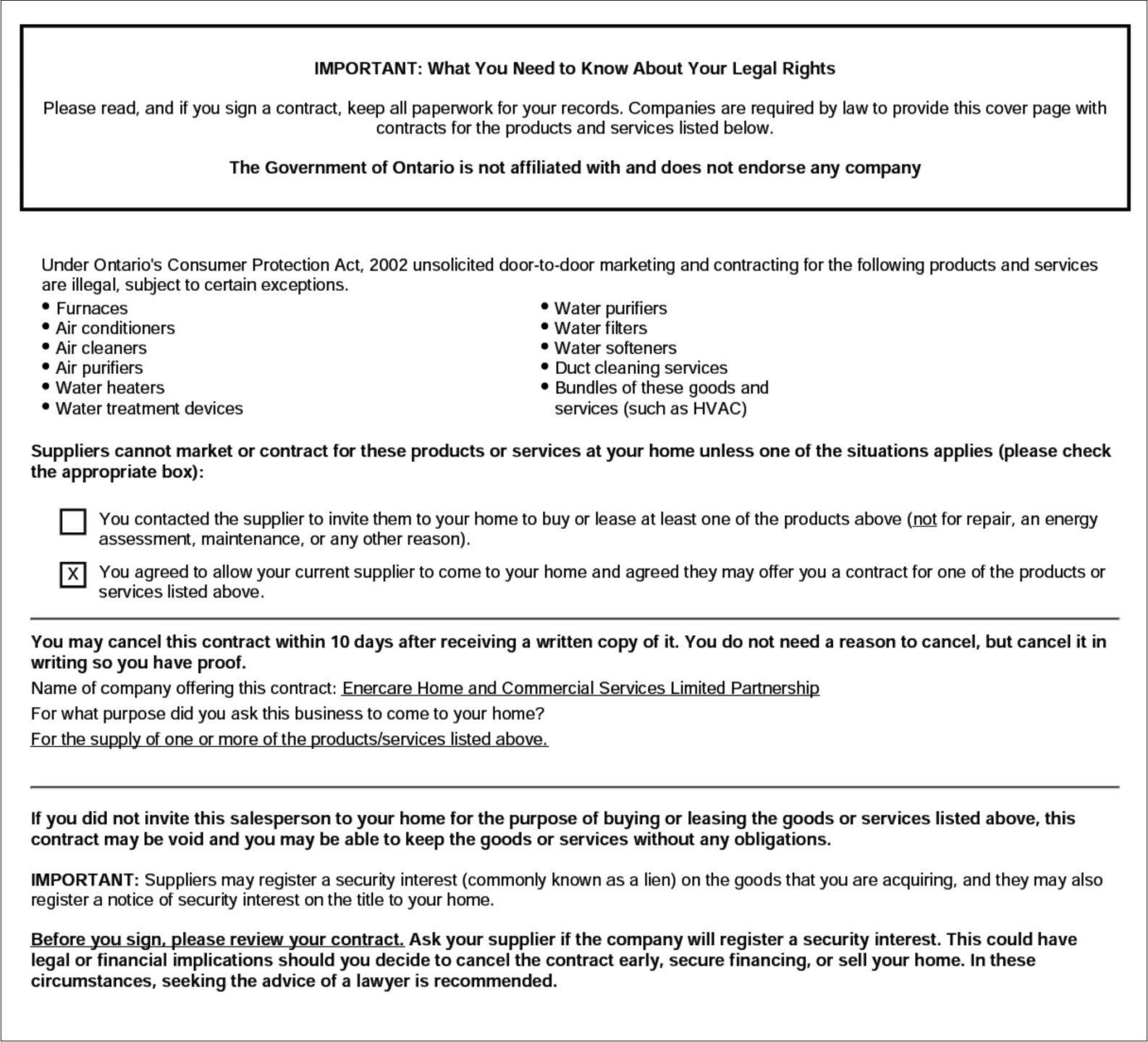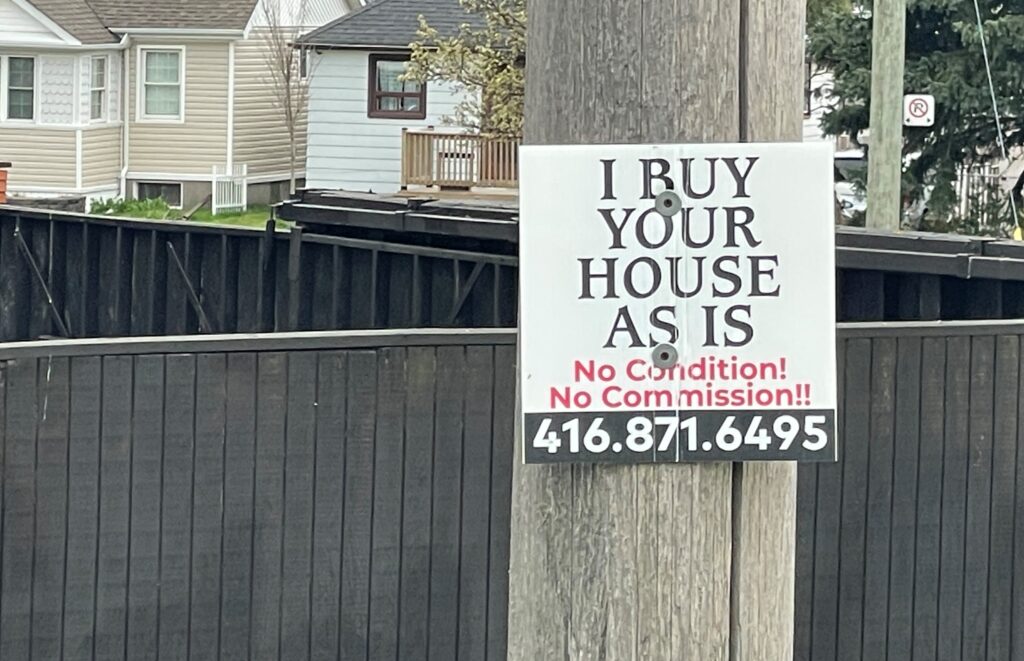Part of me wishes that I could come up with a more “Google-friendly” title for today’s blog post so that Torontonians, Ontarians, or all Canadians could be forewarned about the perils of rental contracts.
Then again, if this were more Google-friendly, it would just mean that I receive 35 emails from people saying, “Can you please help me get out of my rental contract?” in the year 2026 than the 10-15 I’ll probably receive instead.
Today is Thursday. Alright, so I wrote this on Wednesday night, but so far this week I’ve received three emails from people who found blog posts on Google as far back as 2009 that are asking for help with something.
One person emailed to ask whether or not his condominium corporation is responsible to fix the crack in the concrete floor in his storage locker.
Another person emailed about 1,200 words detailing her issues with property management in her Mississauga condo, and if I would be free to help her draft a legal response.
And about an hour before sitting down to write this, a pre-construction buyer from 2019 asked me to look at his Agreement of Purchase & Sale and tell him whether or not he can withhold the funds due on final closing because of what he perceives as “material defects.”
So yeah, sometimes I know what I’m getting myself into when I write a Google-friendly, people-friendly blog post that will stand the test of time as far as this thing called “The Internet” is concerned.
And while I know that somebody reading this right now, circa 2028, is going to email me to ask about their hot water rental contract, I still feel the need to put this into cyberspace.
I fucking hate these rental companies.
Yeah, I swore.
My daughter would say, “Daddy, you used the eff-word. I heard that.”
Then she would ask why.
“Well, honey, sometimes a curse word really helps put an emphasis on something. And sometimes that emphasis is needed.”
“Daddy, it sounds like you’re dealing with big emotions. Next time, just take a breath.”
Yeah, I tried that. Didn’t work.
We’ve all heard rumours, or read newspaper articles, or even seen news programs talk about these “devious rental contracts,” but who among us has actually been roped into one ourselves?
Any hands raised?
Who among us has witnessed a loved one duped by a door-to-door salesman, or their existing service provider, and been roped into some absolutely ludicrous contract to rent a $500 piece of equipment for $100 per month……for ten years?
There is no shortage of articles dealing with this subject.
“Ontario Homeowner Shocked It’s $17,000 To Buy Out A/C And Water Heater Contract”
CTV News
This is one of thousands of these articles that you can probably find online.
But has it happened to anybody that you know?
It almost happened to clients of mine.
I recently sold a house which was essentially land value. It’s an epic property and once upon a time, it was a gorgeous, luxury home. But it’s fallen into a complete state of disrepair, and when the owner passed away, his two children inherited the home.
The “children” are in their 70’s, by the way. Yes, the gentleman had a great, long life!
But one of the children, or heirs, noted that the house was cold one day when he came to check up on it, so he called his service provider, Enercare.
A representative from Enercare came to the property and said that a new furnace was needed.
The furnace would cost a substantial sum of money, so the representative suggested that it be rented instead.
The heir said, “But we’re going to be selling this house in April. We don’t need the furnace past April.”
The representative said, “Tell you what, then, why don’t I give you January, February, March, and April for free! Then you’d be renting the furnace for a nominal month thereafter, and the new buyer of the home can cancel the contract at any time.”
The heir thought this sounded like a fantastic deal, especially considering the fact that the house would be bought and torn down – so the contract would no longer be needed, and he signed the rental agreement on the spot.
A free furnace?
What could possibly go wrong!
I heard about it and I immediately jumped into action.
I requested a copy of the rental contract, and here’s the most egregious part:

Yup.
There was nothing “free” about this.
The moment he signed that contract, he was tying himself to upwards of $33,589.64.
I told him to call the Enercare representative and cancel this contract.
He tried, to his credit.
He told the Enercare rep, “The house is being sold in April and my agent says it’s land value and the buyer will tear down the house. So they won’t need the furnace.”
The rep told him, “That’s fine. Once the house is sold, the furnace is the buyer’s problem.”
The heir came back to me and asked if this was okay, to which I said, No.
That $33,589.64 cost is going to be paid by somebody.
This rental contract had to go.
Luckily, there is consumer protection for this! It’s one thing that our government did do right!
The Consumer Protection Act, 2002 (CPA) gives you rights when you buy something that costs more than $50 from a salesperson, either at your door or in your home.
As a consumer, you:
1) Have the right to cancel a contract without any reason within a 10-day cooling-off period, beginning the day you receive a written copy of the agreement.
2) Must be given a written contract: under the CPA, a consumer contract has to include specific information about the goods or service and your rights as a consumer. If it doesn’t, you can cancel the contract within one year of entering into the agreement.
3) Can cancel the agreement, regardless of its value, up to one year after you entered into it if the business or salesperson you’ve signed your contract with made a false or misleading statement about the contract.
And the most amazing part about this is that the Consumer Protection Act forces all of these companies to include a cover page on their rental agreements, like the following:

If you were a consumer and you were handed this piece of paper, wouldn’t your spidey-sense start tingling?
IMPORTANT: What You Need To Know About Your Legal Rights
Yeah, I’d say that’s a bit of a red flag.
And this section is boxed in black to make it look special. Or, “important,” which it is, very…
But then, amazingly, the types of items that are sold in people’s homes, that necessitate this piece of consumer protection, are outlined!
-Furnaces
-Air Conditioners
-Water Heaters
-Water Filters
-Bundles Of These Goods (such as HVAC)
And so on, and so on.
Enough red flags yet?
Then comes this beauty:

Again, I would ask, “Just how bad is this particular industry that it would necessitate the provincial government enacting specific legislation to protect consumers and instituting a mandatory ten-day ‘cooling off period’ for all buyers of such services?”
Pretty damn bad!
No matter what the sales representative says, and no matter what their toll-free phone operator tells you, every consumer has a right to cancel these contracts within ten-days of signing.
Now, let’s look at the last section:

This is very, very important.
A “lien” is registered on the title to a property, and the property cannot be sold without removing that lien.
Some of these rental companies build their business models around this.
Let’s say that a company sells a rental contract for a hot water heater to a home-owner for $80 per month and subsequently registers a $15,000 lien on the house.
Now, let’s say that three years later, the home-owner goes to sell the home.
Guess what?
The home-owner doesn’t know there’s a $15,000 lien on the home!
Suprise!
Not only that, the original company that sold the rental item doesn’t hold the lien – a third party does.
What?
Yeah.
Company-A sold the hot water rental agreement to the home-owner.
Then Company-A sold their contract to Company-B, usually for a discount.
Company-B registers the lien and bides its time until the home-owner wants to remove the lien, either because of a pending sale, or because the home-owner wants to “buy out” the contract.
In the end, both Company-A and Company-B win, and the home-owner gets screwed.
Earlier this year, I sold a home on behalf of a couple who were in their mid-90’s.
Everything was fine. Great, in fact! Until one week before closing.
That’s when the seller’s lawyer informed the sellers (via their POA who was a family member) that there were three liens on the home.
Three liens.
Three liens that the home-owners didn’t know about. Didn’t have a clue.
One lien was for a water softener.
Another lien was for an HVAC system.
And the third lien? It was for a solar panel that the home-owners didn’t know they had, never intended to rent, and couldn’t ever remember discussing with a sales representative.
Now, you think this is bad? Wait until you hear how greasy this gets…
When the sellers’ son challenged the rental contract and the rental company, and argued, “My parents have no clue what this solar panel is, and never agreed to rent this,” can you guess what the rental company did?
The rental company sent an audio file of a recorded conversation from 2020 with the home-owners.
You know that a company is aware of their own misdeeds when they record every single conversation, with every consumer they scam, and keep them on file and so well-labeled that when the contracts are called into question, the files are readily available.
That’s so shitty.
But it happens all the time.
Imagine a company recording all their conversations specifically because they know that these contracts and liens are going to be challenged?
Mens Rea
I’m I right, folks?
What’s more, is that the liens are often strategically created for an amount of money that makes fighting it in court a wasted effort. If the lien were $50,000, then let’s fight it. But for $15,000, geez, gosh, what’s the time and effort on that, plus the legal fees?
In the case of my 90-year-old clients, it wasn’t even the money that made them feel awful, but rather the fact that they had been “taken.”
Imagine how violating that feels? Or how embarrassed a person would be when their children or POA have to sort this out on their behalf?
These scams are constant, but every so often, we see a company or two getting taken to court.
Here’s an example from last year:
“Toronto CEO, 12 Companies Facing $5M Class Action Lawsuit For Alleged Door-To-Door Rental Scam”
CTV News
September 7th, 2023
From the article:
A Toronto CEO and 12 of his companies are facing a potential class action lawsuit alleging they held their HVAC rental customers’ homeowner titles “hostage” in exchange for “exorbitant” amounts of money, according to a lawyer representing the consumers.
The lawsuit, filed on behalf of Toronto residents Goren Donev and Alga Bonnick, alleges that Crown Crest Capital Management Corp., along with at least 11 other companies run by CEO Lawrence Krimker, all breached Ontario’s Consumer Protection Act by not telling their rental customers that security interests worth thousands of dollars had been taken out against their home titles. The suit also claims that the companies’ sales representatives sold the contracts on a door-to-door basis, a practice banned in Ontario in 2018.
Security interests, which operate similarly to liens, are used as financial collateral by lenders. In this case, they were used to secure the value of the companies’ heating, ventilation, and air conditioning (HVAC) units. They’re a common practice found within the home equipment rental industry, but usually, the interests equal the approximate amount of the equipment.
In this case, the combined amounts leveraged against Donev and Bonnick’s homes exceeded $20,000.
Predatory practices are rampant in the home equipment industry, according to Mohsen Seddigh with Toronto law firm Sotos Class Action, and lenders can stand to benefit from placing costly security interests on titles, as homeowners are often left with little choice but to fork up the sums, he says.
“They may not even be aware of [the interests],” Seddigh told CTV News Toronto. “Usually they only find out when they want to sell their house or get a new mortgage, […] but eventually they have to come begging to get rid of it.”
Who knows where this will end up, but probably nowhere.
And if this company did go under, and this principal did get fined and/or shut down, somebody else is ready to take his place.
You can find his entire defence online, HERE. All twenty-seven pages of it.
It’s a fascinating read. It makes you realize that larger companies are doing what he did, only better.
So, folks, there’s no happy ending in this blog post, unfortunately.
Just be aware.
Be vigilant.
Protect your older relatives and tell them not to sign anything, or agree to anything, without speaking to you first.
































London Agent
at 8:06 am
Rental water heaters are the norm in our area, its a rare benefit to a buyer to purchase a home with an owned water heater sadly.
Freebee
at 8:52 pm
We had a water heater rental when we bought our Hamilton home in early 2000s. After our purchase they told us about the agreement and we asked for the original contract as proof. When they didn’t provide it they threatened to take the water heater away. We told them to go ahead and installed one ourselves from home Depot for 4 months of rent! Never had any water issues since.
Ace Goodheart
at 8:25 am
I actually had this exact problem. Person came door to door, saying they were “from the government” and needed to get into our house to evaluate our water heater. They even had a little badge and wore a yellow safety vest.
My wife let them in and they convinced her to sign a rental agreement for a water heater.
Problem was, we owned our existing heater, which was 8 years old and working perfectly well.
I was able to cancel the agreement but what a lot of work it was to do that. You are right you need to go through several companies to find the one that ended up with the contract. And they never answered their phones.
I ended up having a process server serve their executive officer, at his house, with our cancelation notice. It was nuts. They would not talk to us.
I did take my wife down to Rona to show her how much the $150 per month contract water heater could actually be purchased for. She was quite shocked. Water heaters are cheap and any licensed plumber can install one for you in about an hour.
Graham (the real deal G-funk era)
at 8:30 am
I pay the $30-40 or so every couple of years to pull my property title from the land registry office — Just to make sure there are no weird liens, mortgages, or other charges on there.
Does anyone know if title insurance can help against these types of equipment rental liens?
cyber
at 4:43 pm
I have the same question – the house we bought (via David) ended up having a rented water heater despite not disposing this in the agreement.
It’s only $20 per month so have not bothered to deal with it, and buyer agent never responded to our outreach – but if there’s another way to get some $ back I’d love to know
DAF
at 4:43 pm
Really important blog, thanks David. A good reminder, especially as HWT RENTAL is often found in listings. I will always ask the agent to track me down the cost, the company, the contract and I can’t tell you how many agents consider me to be a pain in the derriere for doing so! WTHWH!
hoob
at 1:40 pm
Also fun when you find a listing that says specifically HWH Rental will be assumed but there are other HVAC rental equipment in place (not just HWH).